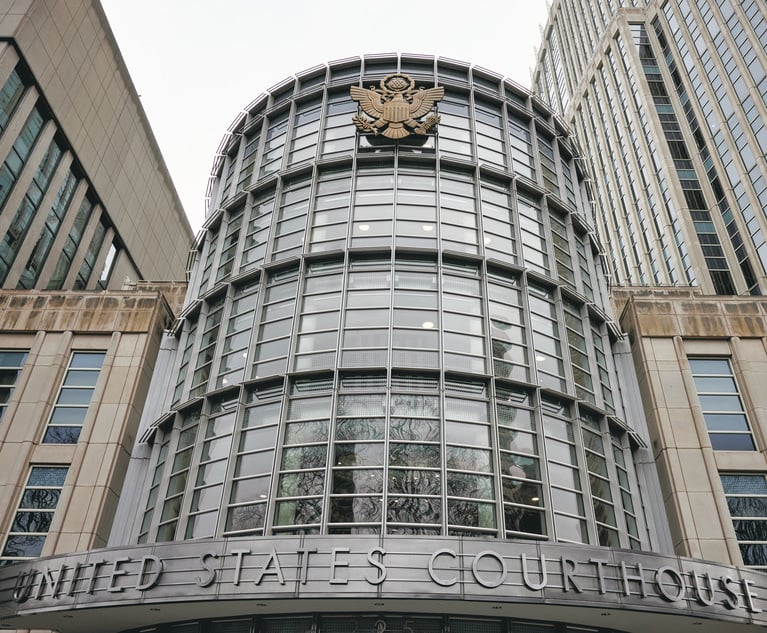We Have an Arbitration Agreement. Now What?
Mark Spatz, Matthew V. Povolny and Nicole Paschal of Cohen & Gresser write: Because the terms of consumer arbitration agreements are generally not negotiable and the agreements themselves are not formed through the typical means of offer and acceptance, courts take great care in analyzing whether an arbitration provision should be enforced against a consumer. Some issues are more easily addressed than others. A company should be mindful of the issues when seeking to enforce the arbitration provision it offers to consumers with its products.
July 18, 2017 at 12:00 AM
12 minute read
The U.S. Supreme Court, in recent years, has provided companies with a powerful tool to avoid class action lawsuits: arbitration. In a series of decisions, the Supreme Court has held that class action waivers in otherwise valid arbitration agreements are themselves enforceable. See Am. Express Co. v. Italian Colors Rest., 133 S. Ct. 2304, 2312 (2013); AT&T Mobility v. Concepcion, 563 U.S. 333, 352(2011). Accordingly, many companies have woven arbitration clauses with class action waivers into their websites' terms of use, warranties, and other consumer agreements with the hope that such arbitration clauses would void any efforts by consumers to file class action lawsuits.
On the surface, enforcing an arbitration clause appears to be fairly straightforward: A company would need to show that the parties have agreed to arbitration and the dispute at issue falls within the scope of the agreement. See, e.g., Kirleis v. Dickie, McCamey & Chilcote, P.C., 560 F.3d 156, 160 (3d Cir. 2009); Combined Energies v. CCI, 514 F.3d 168, 171 (1st Cir. 2008); Cap Gemini Ernst & Young, U.S. v. Nackel, 346 F.3d 360, 365 (2d Cir. 2003).
If only it were so easy. (Indeed, the enforceability of an arbitration provision in the terms and conditions provided to consumers by Uber Technologies is currently pending before the Second Circuit in Meyer v. Kalanick, No. 16-2750.) Because the terms of consumer arbitration agreements are generally not negotiable and the agreements themselves are not formed through the typical means of offer and acceptance, courts take great care in analyzing whether an arbitration provision should be enforced against a consumer. Among other things, a court will examine whether: the consumer was on notice of the arbitration provision, the consumer agreed to its terms, and the terms are fair to the consumer. As discussed below, some of these and other issues are easily addressed, while others can be thornier. Regardless, a company should be mindful of these issues when seeking to enforce the arbitration provision it offers to consumers with its products.
Preliminary Issues
Before addressing the arbitration provision itself, the company will need to consider a few preliminary issues. First, the company may need discovery regarding the facts and circumstances surrounding the formation of the agreement to arbitrate. Second, in a diversity action, the company should carefully consider which state's laws will apply to the question of contract formation because variations in state law could affect the outcome.
This content has been archived. It is available through our partners, LexisNexis® and Bloomberg Law.
To view this content, please continue to their sites.
Not a Lexis Subscriber?
Subscribe Now
Not a Bloomberg Law Subscriber?
Subscribe Now
NOT FOR REPRINT
© 2025 ALM Global, LLC, All Rights Reserved. Request academic re-use from www.copyright.com. All other uses, submit a request to [email protected]. For more information visit Asset & Logo Licensing.
You Might Like
View All
Big Tech and Internet Companies Slammed With Consumer Class Actions in December

GE Agrees to $362.5M Deal to End Shareholder Claims Over Power, Insurance Risks
2 minute read
'No Evidence'?: Big Law Firms Defend Academic Publishers in EDNY Antitrust Case
3 minute read
'Substantive Deficiencies': Judge Grants Big Law Motion Dismissing Ivy League Price-Fixing Claims
3 minute readTrending Stories
- 1Adding 'Credibility' to the Pitch: The Cross-Selling Work After Mergers, Office Openings
- 2Low-Speed Electric Scooters and PIP, Not Perfect Together
- 3Key Updates for Annual Reports on Form 10-K for Public Companies
- 4When Words Matter: Mastering Interpretation in Complex Disputes
- 5People in the News—Jan. 28, 2025—Buchanan Ingersoll, Kleinbard
Who Got The Work
J. Brugh Lower of Gibbons has entered an appearance for industrial equipment supplier Devco Corporation in a pending trademark infringement lawsuit. The suit, accusing the defendant of selling knock-off Graco products, was filed Dec. 18 in New Jersey District Court by Rivkin Radler on behalf of Graco Inc. and Graco Minnesota. The case, assigned to U.S. District Judge Zahid N. Quraishi, is 3:24-cv-11294, Graco Inc. et al v. Devco Corporation.
Who Got The Work
Rebecca Maller-Stein and Kent A. Yalowitz of Arnold & Porter Kaye Scholer have entered their appearances for Hanaco Venture Capital and its executives, Lior Prosor and David Frankel, in a pending securities lawsuit. The action, filed on Dec. 24 in New York Southern District Court by Zell, Aron & Co. on behalf of Goldeneye Advisors, accuses the defendants of negligently and fraudulently managing the plaintiff's $1 million investment. The case, assigned to U.S. District Judge Vernon S. Broderick, is 1:24-cv-09918, Goldeneye Advisors, LLC v. Hanaco Venture Capital, Ltd. et al.
Who Got The Work
Attorneys from A&O Shearman has stepped in as defense counsel for Toronto-Dominion Bank and other defendants in a pending securities class action. The suit, filed Dec. 11 in New York Southern District Court by Bleichmar Fonti & Auld, accuses the defendants of concealing the bank's 'pervasive' deficiencies in regards to its compliance with the Bank Secrecy Act and the quality of its anti-money laundering controls. The case, assigned to U.S. District Judge Arun Subramanian, is 1:24-cv-09445, Gonzalez v. The Toronto-Dominion Bank et al.
Who Got The Work
Crown Castle International, a Pennsylvania company providing shared communications infrastructure, has turned to Luke D. Wolf of Gordon Rees Scully Mansukhani to fend off a pending breach-of-contract lawsuit. The court action, filed Nov. 25 in Michigan Eastern District Court by Hooper Hathaway PC on behalf of The Town Residences LLC, accuses Crown Castle of failing to transfer approximately $30,000 in utility payments from T-Mobile in breach of a roof-top lease and assignment agreement. The case, assigned to U.S. District Judge Susan K. Declercq, is 2:24-cv-13131, The Town Residences LLC v. T-Mobile US, Inc. et al.
Who Got The Work
Wilfred P. Coronato and Daniel M. Schwartz of McCarter & English have stepped in as defense counsel to Electrolux Home Products Inc. in a pending product liability lawsuit. The court action, filed Nov. 26 in New York Eastern District Court by Poulos Lopiccolo PC and Nagel Rice LLP on behalf of David Stern, alleges that the defendant's refrigerators’ drawers and shelving repeatedly break and fall apart within months after purchase. The case, assigned to U.S. District Judge Joan M. Azrack, is 2:24-cv-08204, Stern v. Electrolux Home Products, Inc.
Featured Firms
Law Offices of Gary Martin Hays & Associates, P.C.
(470) 294-1674
Law Offices of Mark E. Salomone
(857) 444-6468
Smith & Hassler
(713) 739-1250






